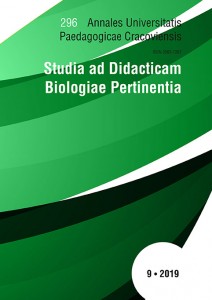Barriers and limits in activities for sustainable development based on the example of the Polish public pedagogical university – current status, perspectives and good models of intersectoral partnership
Barriers and limits in activities for sustainable development based on the example of the Polish public pedagogical university – current status, perspectives and good models of intersectoral partnership
Author(s): Ligia Tuszyńska, Katarzyna Potyrala, Anna PawlakSubject(s): Education
Published by: Wydawnictwo Uniwersytetu Komisji Edukacji Narodowej w Krakowie
Keywords: partnership; education; responsibility; sustainable development; good practices
Summary/Abstract: Academic education, which truly meets the needs of the present, is necessarily connectedwith building a cross-sector partnership. Also in non-traditional areas related to the economy– as in the case of pedagogical studies. Pedagogy, as a social science based on values, aimsto bring up a man responsible for himself and the environment, and therefore also for theoptimal development of civilization in the interests of present and future generations. Itneeds support from entities able to finance some non-standard educational projects.This paper is connected with the research carried out in one of the largest Polish pedagogicaluniversities. The level of awareness of pedagogy students in the area of s ustainabledevelopment issues was examined. It turned out that the pedagogues are not prepared totake on the role of local community leaders in activities for sustainable development.This is due to the limits of the current method of their education, culturally and historicallyconditioned. The Polish educational system is still releasing the years of socialism, preferringindividualism over the interests of the community.Injuries from the past are a barrier in promoting and taking responsibility for the needs ofa wider circle of beneficiaries (which is expressed, inter alia, in the absence of the traditionof volunteering). The fruit of the previous era is also the lack of elaborated procedures foruniversities and colleges to obtain education in humanities and social fields that could cofinancelong-term activities related to upbringing.The authors postulate introducing to pedagogical education subjects related to the conceptand principles of sustainable development understood as education for responsibility forpresent and future generations. They also want to show, as a result of experiences from theirown volunteering, good practices in this field applied at Madonna University in the USA. From2015, there is an educational program for sustainable development, in which students fromHaiti are educated remotely at an academic level from several to several dozen each year,giving them a university degree, enabling them to undertake activities for their country.The program consists of the work of many tens of people: business entities responsiblefor financing, academic staff responsible for the education program and classes, studentsimplementing various voluntary programs and technical service responsible for maintainingthe internet platform and access to it from a country where electricity is not an obvious thing.
Journal: Annales Universitatis Paedagogicae Cracoviensis. Studia ad Didacticam Biologiae Pertinentia
- Issue Year: IX/2019
- Issue No: I
- Page Range: 49-61
- Page Count: 13
- Language: English

